|
It is
historically proven that Evritania was inhabited since the 5th century BC., although Homer
refers to Dolopes, an ancient tribe of the region, as members of the Trojan war at 1100
BC. The name of Evritania traces back to its ancient king's name Evrytos, a man with great
skill in bow.
 Some others, though, insist, that it comes from the Greek word "ev" for "well" and the verb "hre'o", for "flow" so that altogether the word
"Evritania" means the place where there is plenty of fresh and "well
flown" water. The pronuntiation is "Ev-ree-tah-nee-ah" (with accent at
"nee"). Some others, though, insist, that it comes from the Greek word "ev" for "well" and the verb "hre'o", for "flow" so that altogether the word
"Evritania" means the place where there is plenty of fresh and "well
flown" water. The pronuntiation is "Ev-ree-tah-nee-ah" (with accent at
"nee").
Ancient
Evritanians especially honoured Diana (the goddess of hunting) as well as Ulysses for his
ability to be cunning and inventive.
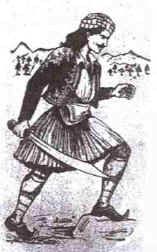 From the era of Roman and Byzantine Empires only a
few ruins can be found at Evritania. Such are the ruins of St Leonides Church in the
village of Clapsi, where an excellent mosaic is still preserved, and is dated since the
5th century AD. From the era of Roman and Byzantine Empires only a
few ruins can be found at Evritania. Such are the ruins of St Leonides Church in the
village of Clapsi, where an excellent mosaic is still preserved, and is dated since the
5th century AD.
During the Turkish occupation from 1453 to 1821,
Evritania proved to be the safest hiding place for the refugees and those who couldn't
bare the Turkish slavery. The whole province is full of the remainings of schools in which
famous teachers of a European culture where teaching, preserving the Greek language
and legacyt, along with the Christian religion, during those unmemorable days.
Monasteries, sanctuaries, chancels, temples, all hidden in distant rocks and caves, were
real shelters for those who were working out the difficult attempt of the National
renovation. There had
been great Evritanian contribution during the Second World War, as well, when H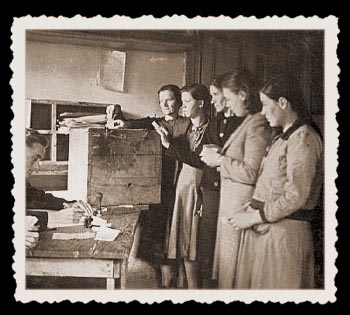 itler's
Nazis and Mussolini's fascists were occupying the whole country. The first "mountain
Government" was established In the village of Viniani during the Spring of 1944 and
it proclaimed elections for a National Committee. itler's
Nazis and Mussolini's fascists were occupying the whole country. The first "mountain
Government" was established In the village of Viniani during the Spring of 1944 and
it proclaimed elections for a National Committee.
This Committee was convoked at
Korischades, in the school building, and made substantial decisions about the Resistance
war.The school building is now a museum, a memorial of what Greeks can achieve if they are
united.At these elections it was the first time in Modern Greek History that women had the
right to vote.
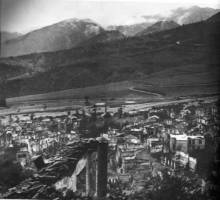 Unfortunatly however, after the end of World War II, Greeks got into a very
severe confilict among themselves. As a result of that bloody civil war, came a lost
decade (1950-1960) while the rest of Europe was recovering. The echo of those dark days,
was depressing the country until recently. Unfortunatly however, after the end of World War II, Greeks got into a very
severe confilict among themselves. As a result of that bloody civil war, came a lost
decade (1950-1960) while the rest of Europe was recovering. The echo of those dark days,
was depressing the country until recently.
At the second
picture below, we can see Karpenissi, at about 1955, a whole ten years after the
libaration from German occupation. As you see not many things had changed since the last
fire set up by Nazis (1944). It was still un-reconstructed.
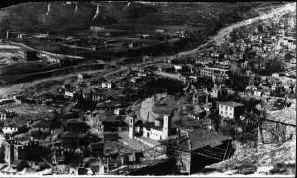
Today, the people of Evritania, with the feeling of hospitality
that they inherited from their ancestors, are working on their rough land, waiting for the
traveller who 'll want to meet them and know all about their motherland, just to offer him
some fruit and a glass of cold water.
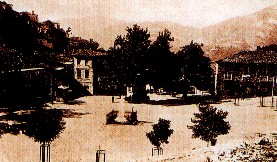 |